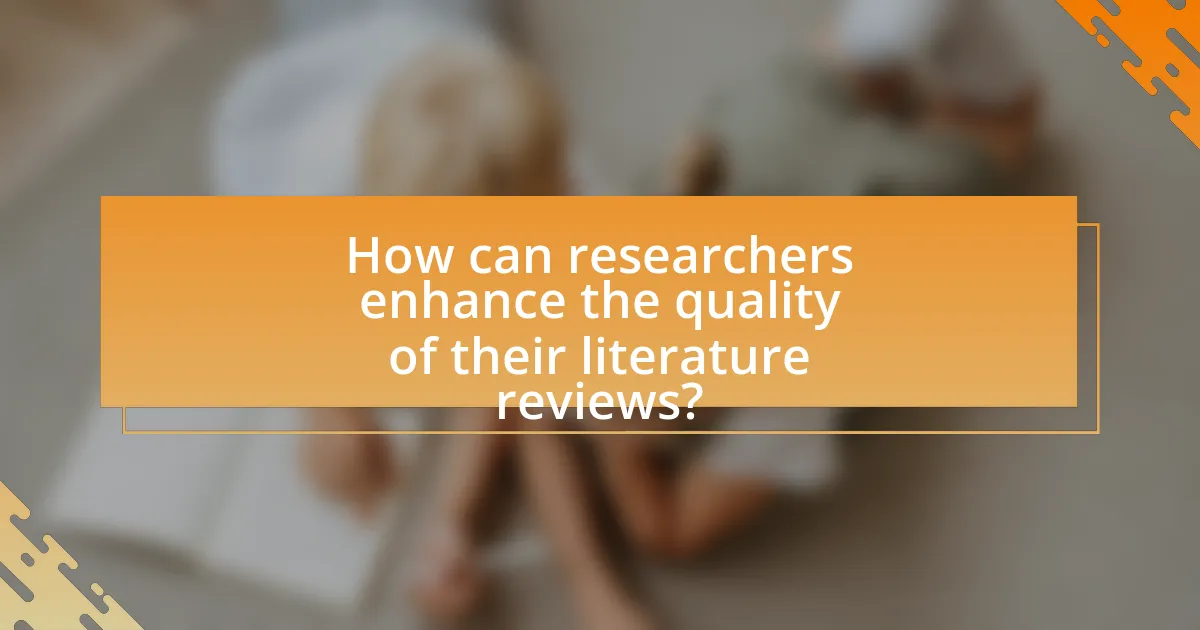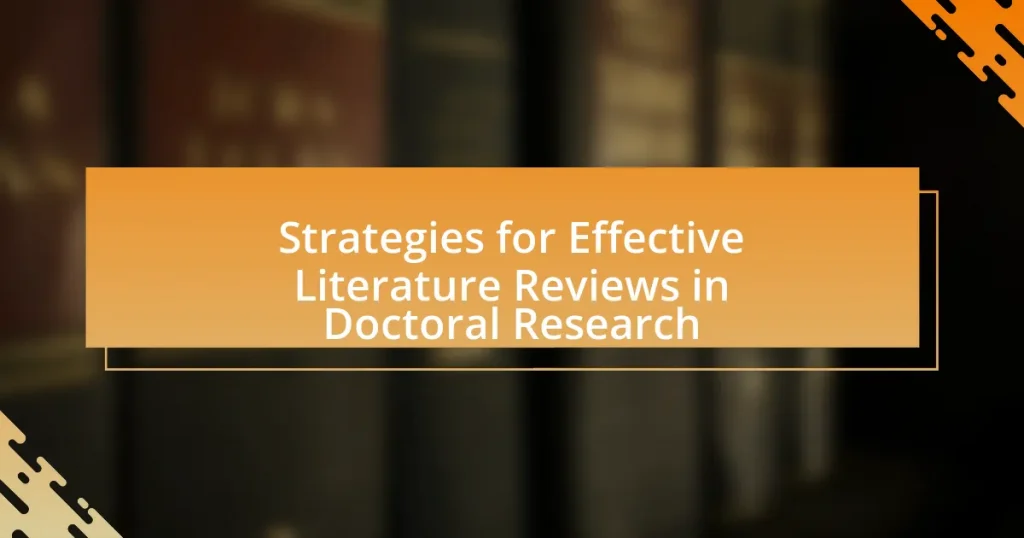The article focuses on strategies for effective literature reviews in doctoral research, emphasizing systematic searching, critical evaluation, and synthesis of relevant literature. Key methods include utilizing comprehensive databases, applying established criteria for source selection, and organizing findings into coherent themes. The article also highlights the importance of critical analysis, the use of reference management tools, and techniques for synthesizing findings to enhance the quality of literature reviews. Additionally, it addresses common pitfalls to avoid and offers practical tips for optimizing time management and maintaining objectivity throughout the review process.

What are the key strategies for effective literature reviews in doctoral research?
Key strategies for effective literature reviews in doctoral research include systematic searching, critical evaluation, and synthesis of relevant literature. Systematic searching involves using comprehensive databases and specific keywords to gather a wide range of sources, ensuring that the review is thorough and inclusive. Critical evaluation requires assessing the quality and relevance of each source, which can be achieved through established criteria such as the credibility of the authors and the rigor of the methodologies used. Synthesis involves organizing the findings into coherent themes or categories, allowing for a clear presentation of the current state of research on the topic. These strategies are supported by research indicating that a well-structured literature review enhances the overall quality of doctoral research and contributes to the development of a strong theoretical framework.
How can researchers identify relevant literature for their reviews?
Researchers can identify relevant literature for their reviews by utilizing systematic search strategies across multiple databases and employing specific keywords related to their research questions. This approach ensures comprehensive coverage of existing studies and facilitates the identification of pertinent articles. For instance, using databases like PubMed, Scopus, and Google Scholar allows researchers to access a wide range of peer-reviewed literature. Additionally, employing Boolean operators (AND, OR, NOT) in search queries can refine results, making it easier to locate studies that directly address the research topic. Furthermore, reviewing the reference lists of key articles can uncover additional relevant sources, enhancing the breadth of the literature review.
What criteria should be used to select sources for a literature review?
To select sources for a literature review, researchers should prioritize criteria such as relevance, credibility, and currency. Relevance ensures that the sources directly address the research question or topic, while credibility assesses the authority of the authors and the reliability of the publication. Currency refers to the timeliness of the information, which is crucial in fields where knowledge evolves rapidly. For instance, a study published in a peer-reviewed journal within the last five years is generally more valuable than an older source in fast-changing disciplines like technology or medicine. These criteria help ensure that the literature review is comprehensive, accurate, and reflective of current knowledge in the field.
How can researchers ensure comprehensive coverage of the topic?
Researchers can ensure comprehensive coverage of the topic by employing systematic literature review methodologies. These methodologies involve defining clear research questions, establishing inclusion and exclusion criteria, and utilizing multiple databases to gather relevant literature. For instance, a systematic review can include studies from various disciplines and sources, ensuring a broad perspective on the topic. Additionally, researchers can use tools like PRISMA guidelines to enhance transparency and reproducibility in their review process, which has been shown to improve the quality of literature reviews in doctoral research.
What role does organization play in literature reviews?
Organization plays a crucial role in literature reviews by providing a structured framework that enhances clarity and coherence. A well-organized literature review allows researchers to systematically categorize and synthesize existing research, making it easier to identify gaps in knowledge and establish a foundation for their own work. For instance, organizing literature thematically or chronologically can help highlight trends and developments in the field, facilitating a more comprehensive understanding of the topic. This structured approach not only aids in the logical flow of information but also improves the overall quality of the review, as evidenced by studies showing that organized literature reviews are more likely to be cited and utilized in subsequent research.
How can researchers categorize literature effectively?
Researchers can categorize literature effectively by employing systematic review methods, which involve defining clear inclusion and exclusion criteria for selecting relevant studies. This approach allows researchers to organize literature into thematic categories based on common variables, methodologies, or findings. For instance, a systematic review by Moher et al. (2015) emphasizes the importance of structured protocols in literature categorization, demonstrating that such methods enhance the reliability and reproducibility of research outcomes. By utilizing tools like bibliographic software and qualitative data analysis techniques, researchers can further streamline the categorization process, ensuring comprehensive coverage of the literature landscape.
What tools can assist in organizing literature reviews?
Tools that can assist in organizing literature reviews include reference management software such as EndNote, Mendeley, and Zotero. These tools enable researchers to collect, organize, and cite literature efficiently. For instance, EndNote allows users to create a personal library of references, while Mendeley offers features for collaboration and annotation. Zotero provides a user-friendly interface for capturing citation information from web pages and databases. Each of these tools supports various citation styles and facilitates the management of large volumes of literature, making them essential for effective literature review organization in doctoral research.
Why is critical analysis important in literature reviews?
Critical analysis is important in literature reviews because it enables researchers to evaluate and synthesize existing knowledge critically. This process helps identify gaps in the literature, assess the validity of previous studies, and establish a theoretical framework for new research. By applying critical analysis, researchers can discern the strengths and weaknesses of various studies, ensuring that their own work is built on a solid foundation. For instance, a study published in the “Journal of Educational Research” highlights that critical analysis enhances the rigor of literature reviews by promoting a more nuanced understanding of the subject matter, ultimately leading to more impactful research outcomes.
How can researchers evaluate the quality of sources?
Researchers can evaluate the quality of sources by assessing criteria such as authority, accuracy, objectivity, currency, and coverage. Authority involves checking the author’s credentials and affiliations to ensure expertise in the subject matter. Accuracy requires verifying the information against reliable references and checking for citations. Objectivity assesses the source’s purpose and potential biases, while currency examines the timeliness of the information, ensuring it is up-to-date. Coverage evaluates the depth and breadth of the content, determining if it comprehensively addresses the topic. These criteria are widely recognized in academic research, as outlined in the “CRAAP Test” developed by the Meriam Library at California State University, Chico, which serves as a practical guide for evaluating sources.
What techniques can be used for synthesizing findings from multiple sources?
Techniques for synthesizing findings from multiple sources include thematic analysis, meta-analysis, and narrative synthesis. Thematic analysis involves identifying and analyzing patterns or themes within qualitative data, allowing researchers to draw broader conclusions from diverse studies. Meta-analysis quantitatively combines results from multiple studies to assess the overall effect size, providing a statistical perspective on findings. Narrative synthesis integrates findings from various studies through a descriptive approach, summarizing and interpreting the results in a coherent narrative. These techniques enhance the robustness of literature reviews by ensuring a comprehensive understanding of the research landscape.

How can researchers enhance the quality of their literature reviews?
Researchers can enhance the quality of their literature reviews by systematically organizing their search strategies and critically evaluating sources. Implementing a structured approach, such as using databases like PubMed or Scopus, allows researchers to access a wide range of peer-reviewed articles. Additionally, employing tools like citation management software can help in organizing references and ensuring comprehensive coverage of relevant literature. Critical evaluation of sources, including assessing the credibility, relevance, and methodological rigor of studies, further strengthens the review’s quality. Studies have shown that well-structured literature reviews lead to more robust research outcomes, as they provide a solid foundation for identifying gaps in knowledge and informing future research directions.
What are common pitfalls to avoid in literature reviews?
Common pitfalls to avoid in literature reviews include failing to define a clear research question, which can lead to a disorganized review. Additionally, neglecting to critically evaluate sources instead of merely summarizing them results in a lack of depth. Another significant pitfall is not maintaining a systematic approach, which can cause important studies to be overlooked. Furthermore, relying on outdated or irrelevant literature can skew the findings. Lastly, insufficient synthesis of the literature, rather than simply listing studies, can hinder the development of new insights. These pitfalls can compromise the quality and effectiveness of the literature review in doctoral research.
How can bias be minimized in literature selection?
Bias can be minimized in literature selection by employing systematic review methods that ensure comprehensive and objective sourcing of relevant studies. Systematic reviews utilize predefined criteria for inclusion and exclusion, which helps to limit personal biases in selecting literature. For instance, the Cochrane Handbook for Systematic Reviews of Interventions outlines rigorous protocols for literature selection, emphasizing the importance of transparency and reproducibility in the review process. By adhering to these structured methodologies, researchers can significantly reduce the influence of subjective judgment and enhance the reliability of their literature reviews.
What strategies can help maintain objectivity in analysis?
To maintain objectivity in analysis, researchers should employ strategies such as using standardized evaluation criteria, incorporating diverse perspectives, and practicing self-reflection. Standardized evaluation criteria ensure that all data is assessed uniformly, reducing bias. Incorporating diverse perspectives, such as consulting with peers or experts from different fields, can provide a broader understanding and mitigate personal biases. Self-reflection allows researchers to recognize their own biases and assumptions, fostering a more balanced analysis. These strategies are supported by research indicating that structured approaches and collaborative discussions enhance objectivity in academic evaluations.
How can feedback improve literature reviews?
Feedback can improve literature reviews by providing critical insights that enhance the clarity, depth, and relevance of the analysis. When reviewers receive constructive criticism, they can identify gaps in their arguments, refine their focus, and ensure that their synthesis of existing research is comprehensive and well-structured. For instance, studies have shown that peer feedback significantly increases the quality of academic writing by highlighting overlooked sources and suggesting alternative interpretations, which ultimately leads to a more robust literature review.
What types of feedback should researchers seek?
Researchers should seek constructive feedback, methodological feedback, and content-specific feedback. Constructive feedback helps identify strengths and weaknesses in their work, allowing for improvements in clarity and argumentation. Methodological feedback focuses on the appropriateness and rigor of research methods used, ensuring that the study design is sound and reliable. Content-specific feedback addresses the relevance and depth of the literature reviewed, guiding researchers to include comprehensive and pertinent sources. Seeking these types of feedback enhances the quality and credibility of the literature review, ultimately contributing to the overall success of doctoral research.
How can peer review enhance the literature review process?
Peer review enhances the literature review process by providing critical feedback that improves the quality and rigor of the review. This process allows researchers to identify gaps in their analysis, ensuring that they consider diverse perspectives and relevant studies. For instance, peer reviewers often highlight overlooked literature or suggest alternative interpretations, which can lead to a more comprehensive understanding of the topic. Additionally, studies have shown that peer-reviewed literature tends to have higher credibility and reliability, as it undergoes scrutiny by experts in the field, thereby strengthening the overall foundation of the literature review.

What practical tips can improve the literature review process?
To improve the literature review process, researchers should adopt systematic approaches such as creating a structured outline, utilizing reference management software, and conducting comprehensive keyword searches. A structured outline helps in organizing thoughts and identifying gaps in the literature, while reference management software like EndNote or Zotero streamlines the citation process and keeps track of sources efficiently. Comprehensive keyword searches ensure that relevant literature is not overlooked, enhancing the depth and breadth of the review. These strategies are supported by studies indicating that systematic reviews yield more thorough and reliable results, as evidenced by the increased citation rates of articles that follow structured methodologies.
How can time management be optimized during literature reviews?
Time management during literature reviews can be optimized by creating a structured plan that includes setting specific goals, establishing a timeline, and utilizing tools for organization. A structured plan allows researchers to allocate time effectively, ensuring that each phase of the review process, such as searching for literature, reading, and synthesizing information, is completed within designated timeframes. Research indicates that setting clear objectives can enhance focus and productivity, as it provides direction and reduces the likelihood of procrastination. Additionally, using reference management software can streamline the organization of sources, making it easier to retrieve and cite relevant literature efficiently.
What scheduling techniques can help researchers stay on track?
Effective scheduling techniques that can help researchers stay on track include time blocking, the Pomodoro Technique, and setting specific deadlines. Time blocking involves allocating specific time slots for different tasks, which enhances focus and productivity. The Pomodoro Technique encourages researchers to work in short, concentrated bursts of 25 minutes followed by a 5-minute break, promoting sustained attention and reducing burnout. Setting specific deadlines for each phase of the research process creates accountability and helps maintain momentum. These techniques are supported by studies indicating that structured time management improves task completion rates and overall research efficiency.
How can setting milestones aid in the literature review process?
Setting milestones aids in the literature review process by providing structured checkpoints that enhance organization and focus. These milestones help researchers break down the extensive task of reviewing literature into manageable segments, allowing for systematic progress tracking. For instance, establishing deadlines for completing specific sections, such as identifying key themes or summarizing findings, ensures that researchers remain on schedule and can allocate time effectively. Research indicates that structured timelines improve productivity and reduce procrastination, which is crucial in the demanding context of doctoral research.
What resources are available to support literature reviews?
Resources available to support literature reviews include academic databases, reference management software, and institutional libraries. Academic databases such as JSTOR, PubMed, and Google Scholar provide access to a vast array of peer-reviewed articles and publications essential for comprehensive literature reviews. Reference management software like EndNote, Mendeley, and Zotero helps organize citations and streamline the writing process. Institutional libraries often offer access to specialized databases, interlibrary loans, and research assistance, further enhancing the literature review process. These resources collectively facilitate the gathering, organization, and analysis of relevant literature, ensuring a thorough and effective review.
Which databases are essential for comprehensive literature searches?
Essential databases for comprehensive literature searches include PubMed, Scopus, Web of Science, and Google Scholar. PubMed provides access to a vast collection of biomedical literature, Scopus covers a wide range of disciplines with citation analysis, Web of Science offers comprehensive citation data across various fields, and Google Scholar allows for broad searches across multiple sources. These databases are widely recognized for their extensive coverage and reliability in academic research, making them crucial for thorough literature reviews in doctoral research.
What software tools can facilitate the literature review process?
Software tools that can facilitate the literature review process include reference management software, systematic review software, and note-taking applications. Reference management software like EndNote and Zotero allows researchers to organize citations, generate bibliographies, and manage PDFs efficiently. Systematic review software such as Covidence and Rayyan streamlines the process of screening studies and data extraction, making it easier to conduct comprehensive reviews. Note-taking applications like Mendeley and OneNote help researchers annotate articles and organize their thoughts, enhancing the overall efficiency of the literature review process. These tools are widely recognized in academic research for their ability to improve organization and productivity during literature reviews.



